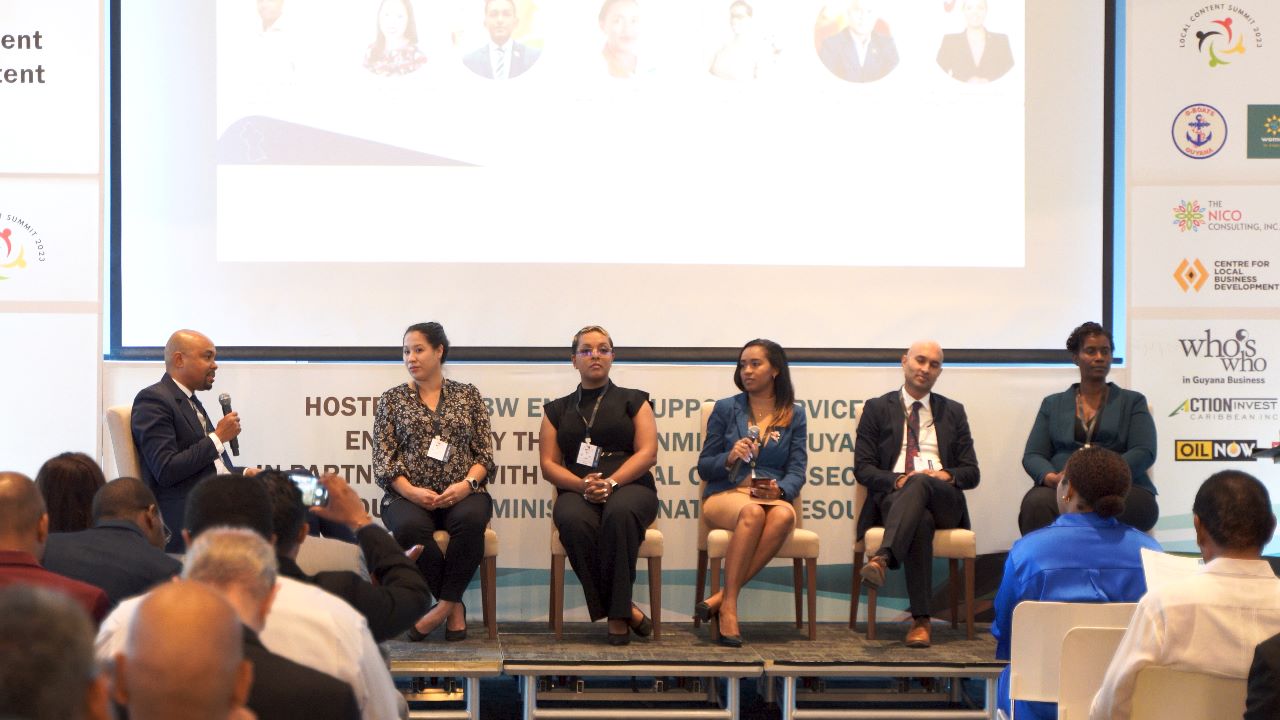Access to finance continues to be the common theme in local content discussions, as it remains a main hindrance to the success of local enterprises desirous of tapping into Guyana’s expanding oil sector.
As the inaugural Local Content Summit 2023 got underway on Tuesday, every local representative of the first panel – “Local Content Success Stories” – shared similar experiences where access to finance served as a stumbling block to their ventures.
There was Nicholas Deygoo-Boyer, Director at NRG Holdings, a company embarking on a major port project that will transform the West Bank of Demerara, bringing hundreds of jobs to Guyanese.
“It was not easy to raise capital for a project like this,” Boyer shared.
Boyer said his partners “bit off more than they can chew” with the US$300 million venture and needed to inject external capital into the project. But he explained that the contract with Stabroek Block operator ExxonMobil was structured in a unique way to ensure it maintained optimal local content.
“They [Exxon] carved up the lease so that they can give us some of the lease payments early on, so that we did not have to borrow as much,” he explained.
The NRG Director was keen to point out that while Guyana is growing at a rapid pace, it still remains a “risky destination to invest” by the perception of international banks and major financiers, where many locals turn to finance their ventures.
Coleen Abrams, Chief Executive Officer of MatPal, an oil and gas training institute, shared that management has been forced to “go into their pockets” just to ensure that young Guyanese get the training they need to make a meaningful contribution to the sector.
“Access to finance remains a challenge, because of the cost of oil and gas training. It affects students because some interested persons may not want to come forward because of their economic situation,” Abrahams explained.
Key to MatPal’s success, she said, was collaboration with major oil companies operating in Guyana. She mentioned that Tullow Oil’s mentorship programme plays a key role giving young Guyanese industry standard training opportunities. SBM Offshore, one of ExxonMobil Guyana’s major contractors, is another company with such a programme.
Kerri Gravesande Bart, the CEO of Strategic Recruitment Solutions, whose niche market is the oil and gas sector, recalled having to “chop up” her company by divesting shares because of how capital intensive the industry is.
“I also had to bring on investors etc. and that in itself has been a huge challenge for me,” Bart shared. And if that was not hard enough, Bart noted that long payment periods from oil companies is another major roadblock. The government, last year, had put in place a mandatory 45-day payment period after complaints were lodged against oil companies.
And this method is thought to be effective in ensuring that Guyanese nationals and Guyanese companies generate capital to expand while becoming competitive and financially independent.
Private sector body, the Georgetown Chamber of Commerce and Industry has championed the access to finance issue.
Minister of Finance, Dr. Ashni Singh, has committed to tackling the legal and regulatory hurdles to access to finance once they are pointed out by financial institutions.
But to date, they are still still waiting on this.



